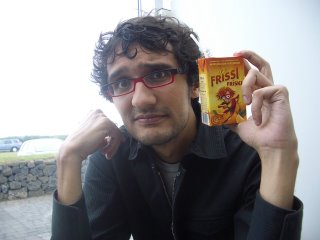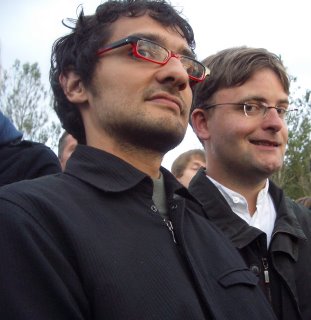recently seen after logging into my facebook:
"X joined the group Nobody Cares That You Want the Old
Facebook Back."
and so begins our stroll into hard-to-control presentation of your life on
facebook. i had been thinking about this a lot, and we had a facebook discussion in my
computer-mediated communication class, which
grant and i followed-up on after class. i've put together my thoughts below.
backgroundfor those of you not in the know:
facebook launched a feature which automatically publishes to your friends a news feed of the things you've been up to on
facebook (and conversely, you also have this feed of what your friends are up to). for instance, you learn when your friends add new friends, join groups, change their profile, change their relationship status, etc..
but hold on, you say... "change their relationship status!" yes! "X is now single."
sort of freaky eh?
well, maybe you feel this is somewhat less freaky when you learn that
facebook updated the feature to include an opt-out policy? i don't think it should be less freaky. in fact, maybe it should be more disconcerting if you care about control of your data and privacy.
issuesan issue for me is that the "resolution" was to add opt-out ability, and make opt-in the default. i think the way
facebook did this falls into the collection of actions by large companies that make your data functionally less private, without adequately conveying that to the user. it also shifts the norm of online interactions and our expectations of the servers we interact with (ie this feed stuff will become the norm on facebook, just as gmail contextual ads became the accepted gmail thing).
facebook is about broadcasting yourself to your friends and people in your network, but not in this uncontrollable way. sure, in the "Old
Facebook" people could scrape your page and determine when and what things were changing. but by and large people interacted with tailored presentations. now, with these feeds, a user's presentation on
facebook is at least partially out of their control.
wait, you say, that user who misses their control can change their options and opt-out. of course they can, but how many will? and how many will get burned because they didn't (i already know stories of people who have been burned)? and when will we consider that we're making friendly surveillance the norm?
frankly i feel weird seeing this feed because i don't know if this is what my friend intended. did they want me to know that they recently added "candy" to their favorite activities?
facebook could have introduced this feature differently. the way they introduced this feature (no options) and then their resolution (opt-out) goes to show how little respect is afforded to users when it comes to who controls the use of their personal information.
 i've been watching battlestar galactica lately and i love it. it's so much better than star trek. besides the obvious benefit to having a long storyline (as opposed to one-off episodes which certainly get tiring), i really enjoy how the portrayal is not so super hitech to the point of stupidity.
i've been watching battlestar galactica lately and i love it. it's so much better than star trek. besides the obvious benefit to having a long storyline (as opposed to one-off episodes which certainly get tiring), i really enjoy how the portrayal is not so super hitech to the point of stupidity.










